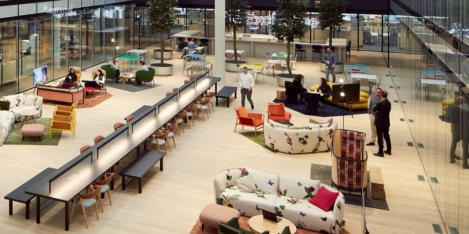To provide the best experiences, we use technologies like cookies to store and/or access device information. Consenting to these technologies will allow us to process data such as browsing behaviour or unique IDs on this site. Not consenting or withdrawing consent, may adversely affect certain features and functions.
The technical storage or access is strictly necessary for the legitimate purpose of enabling the use of a specific service explicitly requested by the subscriber or user, or for the sole purpose of carrying out the transmission of a communication over an electronic communications network.
The technical storage or access is necessary for the legitimate purpose of storing preferences that are not requested by the subscriber or user.
The technical storage or access that is used exclusively for statistical purposes.
The technical storage or access that is used exclusively for anonymous statistical purposes. Without a subpoena, voluntary compliance on the part of your Internet Service Provider, or additional records from a third party, information stored or retrieved for this purpose alone cannot usually be used to identify you.
The technical storage or access is required to create user profiles to send advertising, or to track the user on a website or across several websites for similar marketing purposes.
 More than half of people questioned in research by HR software and services provider MHR claim they have experienced what they consider to be gaslighting at work. The Twitter poll of 3,033 people aged between 18 and 54 found that 58 percent of respondents have experienced what they consider to be gaslighting during their working lives. Thirty percent of respondents said they hadn’t experienced gaslighting in the workplace, with 12 percent saying they didn’t know. (more…)
More than half of people questioned in research by HR software and services provider MHR claim they have experienced what they consider to be gaslighting at work. The Twitter poll of 3,033 people aged between 18 and 54 found that 58 percent of respondents have experienced what they consider to be gaslighting during their working lives. Thirty percent of respondents said they hadn’t experienced gaslighting in the workplace, with 12 percent saying they didn’t know. (more…)
















 The majority of working women experiencing the menopause say it has a negative impact on them at work, finds a new survey from the CIPD. The research found that three out of five (59 percent) working women between the ages of 45 and 55 who are experiencing menopause symptoms were finding it impacted them at work. In response, the CIPD has launched
The majority of working women experiencing the menopause say it has a negative impact on them at work, finds a new survey from the CIPD. The research found that three out of five (59 percent) working women between the ages of 45 and 55 who are experiencing menopause symptoms were finding it impacted them at work. In response, the CIPD has launched 
 Ahead of daylight savings this weekend,
Ahead of daylight savings this weekend, 
















March 28, 2019
The rise of the digital workplace is transforming the physical office
by Giles Fuchs • Comment, Coworking, Workplace design
(more…)